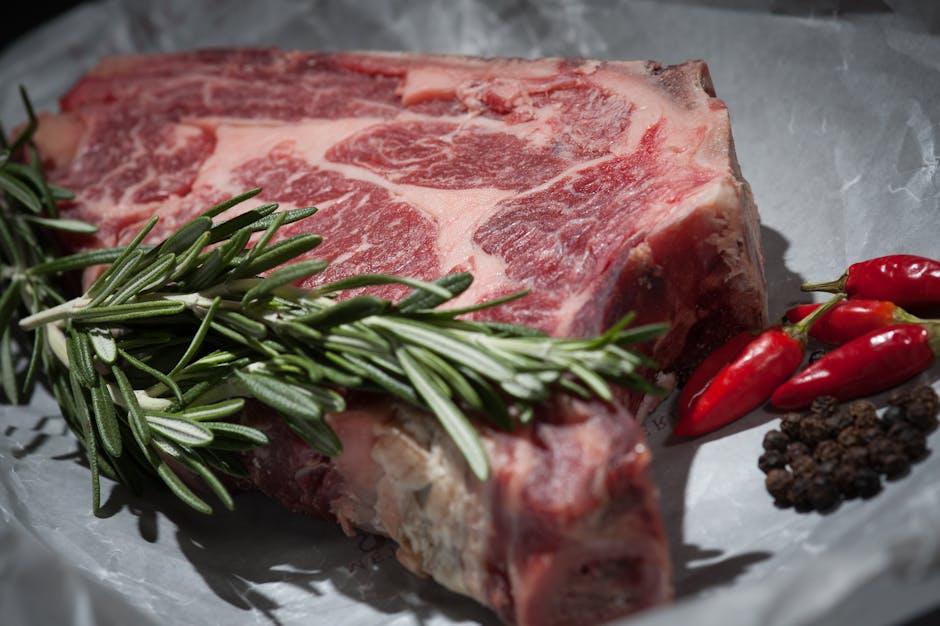In the culinary world, few ingredients evoke as much passion and debate as red meat. For some, it’s the centerpiece of a hearty meal, a symbol of tradition and comfort. For others, it’s a dietary villain, a source of health woes best minimized or eliminated altogether. As scientific research continues to unveil the complexities of nutrition, the question looms larger than ever: should red meat be limited or eliminated for optimal health? This article embarks on an exploration of the multifaceted relationship between red meat and well-being, delving into the latest studies, dietary guidelines, and cultural perspectives. Join us as we navigate the savory and contentious landscape of red meat, seeking a balanced understanding that respects both individual choice and the quest for health.
Exploring the Nutritional Profile of Red Meat
Red meat has long been a staple in many diets, cherished for its rich flavor and dense nutritional profile. When exploring the nutritional aspects of red meat, it’s essential to consider both its benefits and potential drawbacks. On the one hand, red meat is a valuable source of essential nutrients such as:
- Protein: Essential for muscle growth and repair.
- Iron: Particularly heme iron, which is more readily absorbed by the body compared to plant-based sources.
- Vitamin B12: Crucial for nerve function and the production of DNA and red blood cells.
- Zinc: Supports the immune system and metabolic function.
However, concerns have been raised about the potential health risks associated with excessive red meat consumption. Studies suggest links between high red meat intake and increased risks of heart disease, certain cancers, and other health issues. The saturated fats and cholesterol present in red meat can contribute to these concerns, prompting health experts to recommend moderation. Balancing these nutrients with a varied diet and considering plant-based protein alternatives may offer a pathway to optimizing health without completely eliminating red meat from the table.

Understanding the Health Risks and Benefits
Exploring the consumption of red meat reveals a complex picture of both potential health benefits and risks. On one hand, red meat is a rich source of essential nutrients such as iron, zinc, and vitamin B12, which are vital for various bodily functions. Including moderate amounts in a balanced diet can support muscle growth and repair, particularly for individuals with increased protein needs. Additionally, for those with iron-deficiency anemia, red meat can serve as a beneficial dietary component.
Conversely, excessive consumption has been linked to several health concerns. Some of the potential risks include:
- Increased cholesterol levels, which may lead to cardiovascular diseases.
- Heightened risk of certain types of cancer, such as colorectal cancer.
- Possible contribution to the development of type 2 diabetes.
Understanding these factors can help individuals make informed decisions about their dietary choices, aiming for a balanced approach that aligns with their personal health goals.

Balancing Red Meat in a Nutritious Diet
Incorporating red meat into a balanced diet requires thoughtful consideration of both its benefits and potential drawbacks. Red meat is a valuable source of essential nutrients, such as iron, zinc, and vitamin B12, which play a crucial role in maintaining overall health. However, moderation is key to reaping these benefits without compromising well-being. Here are some guidelines to help strike the right balance:
- Choose lean cuts: Opt for cuts like sirloin, tenderloin, or round steak, which are lower in saturated fats.
- Portion control: Keep servings small, around 3-4 ounces, to avoid excessive calorie and fat intake.
- Frequency: Limit red meat consumption to a few times a week, incorporating plant-based proteins and other lean meats for variety.
- Cooking methods: Grilling, broiling, or baking are healthier options compared to frying, which adds unnecessary fats.
Balancing red meat intake with other protein sources and a variety of fruits, vegetables, and whole grains can contribute to a nutritious diet that supports long-term health. By making informed choices, individuals can enjoy the flavors and nutrients of red meat while minimizing potential health risks.

Expert Recommendations for Red Meat Consumption
- Moderation is Key: Experts suggest that red meat can be part of a balanced diet if consumed in moderation. It’s recommended to limit intake to about 1-2 servings per week to reduce potential health risks such as heart disease and certain cancers.
- Quality Over Quantity: Opt for lean cuts and grass-fed varieties when possible. These options are often lower in saturated fats and may contain more beneficial nutrients like omega-3 fatty acids.
- Balance with Plant-Based Options: To ensure nutritional balance, incorporate a variety of plant-based proteins such as beans, lentils, and tofu. These alternatives can provide essential nutrients and fiber that red meat lacks.
While the debate over red meat consumption continues, focusing on the quality and quantity of meat, alongside a diverse diet, appears to be a sensible approach. Experts encourage individuals to listen to their bodies and consult healthcare professionals to tailor dietary choices to personal health needs.
Closing Remarks
As we draw the curtains on this exploration into the complex world of red meat and its place in our diets, we find ourselves standing at the crossroads of tradition and modernity, science and taste. The sizzling allure of a steak on the grill is a sensory delight that has been cherished for generations, yet the whispers of caution from health experts remind us of the potential cost of overindulgence.
the decision to limit or eliminate red meat is as personal as it is profound, woven into the fabric of our individual health needs, ethical beliefs, and cultural practices. Like a masterful symphony, the pursuit of optimal health requires a harmonious balance of various elements, each note contributing to the melody of well-being.
As you ponder your own dietary choices, let this be an invitation to explore with curiosity and mindfulness. Whether you choose to savor red meat in moderation or seek nourishment from alternative sources, may your journey be guided by knowledge, fueled by passion, and enriched by the vibrant tapestry of life.
And so, the dialogue continues—a testament to our ever-evolving understanding of what it means to truly nourish the body and soul.

